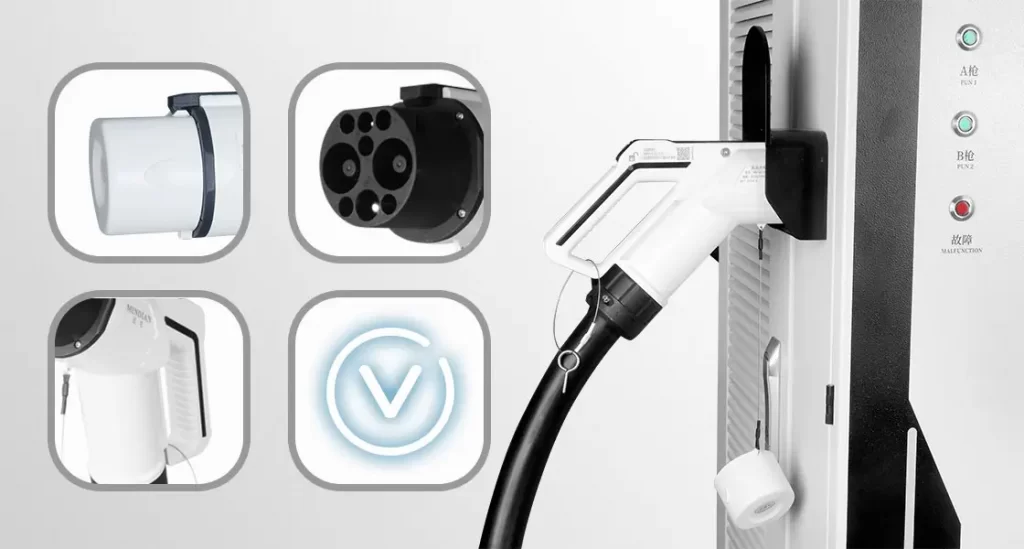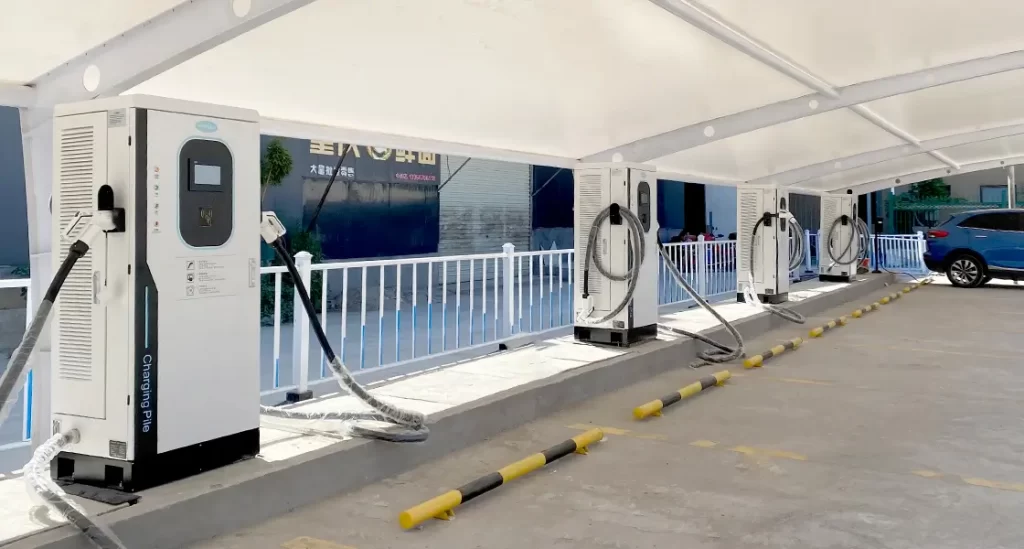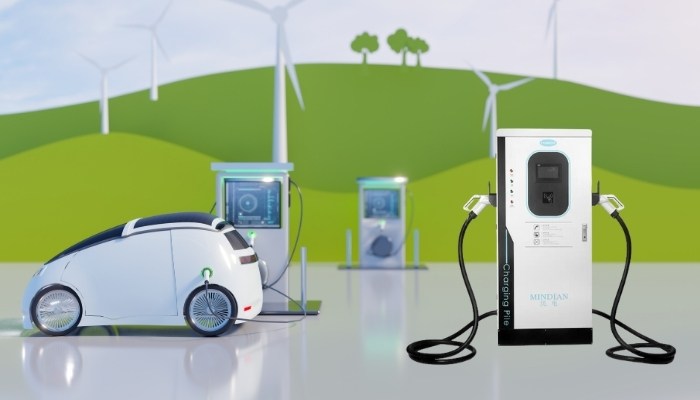With the rapid popularity of EVs worldwide, the demand for commercial EV charging stations has grown exponentially. Data shows that installing a commercial EV charging station costs between $2000 and $100,000. These charging stations also have different cost prices due to factors such as long-term maintenance costs, power upgrades, and installation fees.
If you plan to become a business owner who installs a commercial EV charging station, then in this article we will tell you how much a commercial EV charging station costs. Help you analyze the market, and factors that affect cost, and find the right manufacturer for you to help you make the best choice!
Table of Contents
ToggleWhat Are Commercial EV Charging Stations?

Commercial EV charging stations are charging facilities designed for public or corporate use, providing electricity for EVs to charge, and are usually installed in parking lots, gas stations, shopping malls, office buildings, etc.
These charging stations can serve multiple users and support multiple charging speeds (such as Level 2 or DC fast charging) to meet the changing needs of different EVs while helping companies attract customers and support environmental goals.
How Much Does a Commercial Ev Charging Station Cost?
The cost of a commercial EV charging station varies depending on the type, installation requirements, and additional features. On average, a Level 2 charging station costs between $2,000 and $12,000 per port, including equipment and installation. For faster DC chargers, costs can range from $50,000 to over $100,000 due to higher power requirements and advanced technology.
Additional expenses such as electrical upgrades, trenching, permits, and software management systems can significantly increase the total cost. However, many businesses offset these expenses through government grants, tax incentives, and revenue generated from charging fees. Understanding your site conditions and user needs is key to estimating the final investment in charging infrastructure.
Key Component Costs for Commercial EV Charging Stations
1. Hardware Costs
The first significant expense is the hardware required for the charging station itself.
Charger Types
- Level 2 Chargers: Commonly used in commercial applications, these cost between $1000 and $6,500 per charger, depending on features and performance.
- DC Fast Chargers: These high-powered chargers can cost anywhere from $10,000 to $40,000 each. They offer faster charging speeds but require more advanced infrastructure.
Additional Equipment
Cables, connectors, docks, and mounting hardware can add another $1,000 to $3,000 each.
2. Software and Management Systems
Many commercial chargers come with integrated software for monitoring, payment, and usage analytics.
These systems typically cost between $300 and $1,000 per charger per year, depending on the provider and features.
Integration with payment systems such as mobile apps or RFID readers may incur additional setup fees.
3. Power Infrastructure
The site’s power infrastructure often needs to be upgraded or prepared.
- Transformers and panels: Costs range from $2,000 to $50,000, depending on power needs and existing infrastructure.
- Energy storage: Some businesses choose on-site energy storage or solar panels to reduce operating costs, which can cost an additional $20,000 to $100,000 or more.
Installation Costs
1. Site Assessment and Preparation
Before installation, a site assessment must be conducted to evaluate the feasibility of the project.
- Site Survey: A professional assessment typically costs $1,000 to $3,000.
- Preparation: Excavation, trenching, and foundation work can add $5,000 to $50,000, depending on the complexity of the site.
2. Labor and Equipment
Hiring licensed electricians and contractors is a significant expense.
Installation labor costs range from $3,000 to $20,000 or more per charger, especially for DC fast chargers that require specialized equipment.
3. Permits and Inspections
Local regulations must be followed.
Permits typically cost between $100 and $1,000, and inspections can add another $500 to $2,000.
Ongoing operating costs
1. Electricity usage
Electricity costs are affected by location, utility rates, and time-of-use charges.
On average, businesses pay between $0.10 and $0.30 per kilowatt-hour, but the exact amount can vary widely.
Charging station owners can offset costs by integrating renewable energy or participating in utility demand response programs.
2. Maintenance
Regular maintenance ensures reliability and longevity.
Level 2 chargers typically have annual maintenance costs between $400 and $1,000 per unit.
DC fast chargers use advanced technology and can cost as much as $1,000 to $2,000 or more per year.
3. Network costs
Connected charging networks allow public access and provide management tools.
Subscription fees for each charger range from $250 to $1,000 per year, depending on the provider.
Benefits of Installing a Commercial EV Charging Station

Installing commercial EV charging stations does bring significant business benefits and market advantages, such as:
- Attract and retain customers: Volvo’s research shows that 55% of EV owners prefer businesses that offer charging services, and these customers usually stay longer and spend more. Installing charging stations can not only attract more EV users but also improve customer loyalty.
- Enhance brand image: Research shows that 80% of American consumers are willing to change their consumption habits to reduce environmental impact. Installing EV charging stations visually demonstrates a company’s commitment to environmental protection, helps attract customers who care about sustainability, and enhances brand reputation.
- Increase revenue opportunities: By setting reasonable charging fees or adopting a membership system, commercial charging stations can help companies recover initial investment and operating costs, and even create long-term profits. In addition, some charging stations are also equipped with advertising displays to bring additional advertising revenue to companies.
- Enjoy government incentives: Many regions provide subsidies or tax credits to support companies in installing charging infrastructure. These incentives can effectively reduce initial investment costs and further improve the economics of investment.
- Enhance employee benefits: Providing employees with EV charging facilities can help improve employee satisfaction and attract high-quality talents with strong environmental awareness.
By meeting the growing demand for EV charging, companies can not only seize market opportunities but also achieve a win-win situation between environmental protection and economic benefits.
Who Is Suitable for Installing Commercial Charging Piles?
The following groups of people or organizations are particularly suitable for installing commercial charging piles:
- Operators of commercial places: such as shopping malls, restaurants, hotels, and supermarkets, installing charging piles can attract electric car owners to stay longer, increase consumption, and demonstrate the company’s environmental awareness.
- Office building and park managers: Providing charging services to employees and visitors not only enhances the attractiveness of the workplace but also serves as corporate welfare to attract more high-quality talents with strong environmental awareness.
- Property management companies: Install charging piles in residential areas or parking lots to provide convenience for residents, increase property value, and meet the growing demand for EV use.
- Operators of gas stations or highway service areas: By adding EV charging stations, seize the market opportunities brought by the popularization of EVs and provide a variety of energy replenishment options for passing vehicles.
- Environmentally friendly enterprises or organizations: Enterprises or organizations that focus on sustainable development further promote green energy by installing charging piles and contributing to reducing carbon emissions.
- Government agencies and public facility managers: Install charging piles in public parking lots, transportation hubs, or municipal facilities to support the construction of urban EV infrastructure and promote the realization of regional environmental protection goals.
- Commercial investors or entrepreneurs: Use charging piles as part of the business model and create a source of income through reasonable pricing and additional services (such as advertising screens).
For the above groups, installing commercial charging piles is not only a practical action to respond to market demand, but also can bring multiple values of economic benefits, brand enhancement, and social responsibility.
How to Choose the Right Commercial EV Charging Station for Your Business?
To choose the right commercial EV charging station for your business, you need to consider user needs, charging station type (such as Level 2 or DC fast charging), site conditions, power capacity, and budget cost, while making full use of government subsidies to reduce investment.
Choose equipment that supports intelligent management, flexible payment, and meets safety certification to ensure efficient operation and user convenience. In addition, you also need to pay attention to the scalability of the charging station to meet the future growth demand for EVs and maximize economic and environmental benefits.
Why Choose MOREDAYDC?
MOREDAYDC offers a wide range of EV charging solutions to meet every need, whether retail or wholesale. Pricing is flexible, and the more you buy, the greater the wholesale discount you receive.
Whether you are looking for a single charging station or planning to place a bulk order, MOREDAYDC ensures competitive pricing and exceptional service. Contact our sales team online today to get personalized help and the best deals for your EV charging needs!
Related reading: Are EV Charging Stations Profitable?


